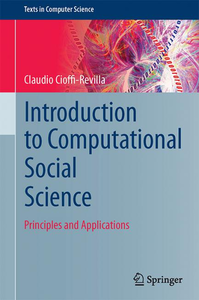Introduction to Computational Social Science: Principles and Applications
By : Claudio Cioffi-Revilla
Release date: Jan 2014
Springer Verlag
ISBN: 978-1-4471-5660-4


Introduces the key concepts in computational social science, including political science, providing formal definitions and a glossary.
Describes the scope and content of each area of computational social science, covering topics on information extraction, social networks, complexity theory and social simulations.
Discusses a number of methodological tools, including extracting entities from text, computing social network indices and building an agent-based model
The emerging field of computational social science (CSS) is devoted to the pursuit of interdisciplinary social science research from an information processing perspective, through the medium of advanced computing and information technologies.
This reader-friendly textbook/reference is the first work of its kind to provide a comprehensive and unified Introduction to Computational Social Science. Four distinct methodological approaches are examined in particular detail, namely automated social information extraction, social network analysis, social complexity theory, and social simulation modeling. The coverage of each of these approaches is supported by a discussion of the historical context and motivations, as well as by a list of recommended texts for further reading.
Topics and features:
- Describes the scope and content of each area of CSS, covering topics on information extraction, social networks, complexity theory, and social simulations
- Highlights the main theories of the CSS paradigm as causal explanatory frameworks that shed new light on the nature of human and social dynamics
- Explains how to distinguish and analyze the different levels of analysis of social complexity using computational approaches
- Discusses a number of methodological tools, including extracting entities from text, computing social network indices, and building an agent-based model
- Presents the main classes of entities, objects, and relations common to the computational analysis of social complexity
- Examines the interdisciplinary integration of knowledge in the context of social phenomena
This unique, clearly-written textbook is essential reading for graduate and advanced undergraduate students planning on embarking on a course on computational social science, or wishing to refresh their knowledge of the fundamental aspects of this exciting field.
Content Level » Graduate
Keywords » Complexity Theory - Computational Social Science (CSS) - Social Data Mining - Social Geographic Information Systems (SocioGIS) - Social Network Analysis - Social Simulation
Related subjects » Database Management & Information Retrieval - Information Systems and Applications - Social Sciences - Theoretical Computer Science











